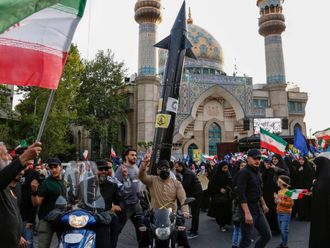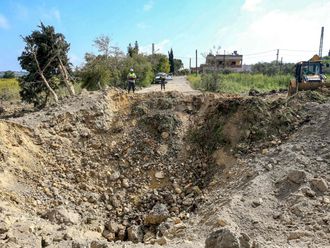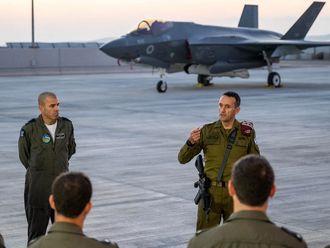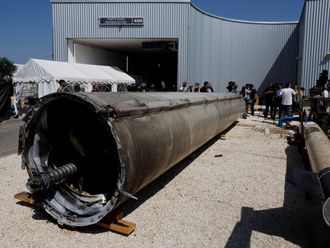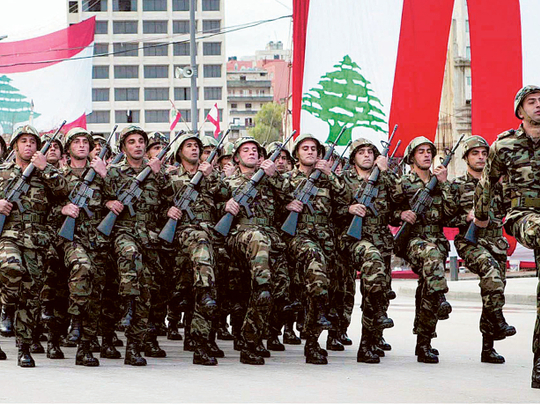
Beirut: Saudi Arabia shocked the Lebanese when it ended its $4 billion (Dh14.68 billion) grants — $3b to the Lebanese Armed Forces (LAF) and a $1 billion to the Internal Security Forces — to register its disapproval of recent diplomatic stances taken by the Lebanese foreign ministry.
Although too early to determine with any certainty, the Saudi move threatened to further enlarge the gap between the pro-Syrian March 8 and the anti-Syrian March 14 political alliances, though the best illustration of how most felt was provided by the local newspaper Daily Star, whose lead editorial on Saturday read: “The price of ingratitude”.
Lebanese officials, including Minister of Interior Nouhaq Al Mashnouk, anticipated additional responses in the next phase including the withdrawal of large deposits from the Central Bank that have effectively supported the Lebanese pound.
Riyadh, followed by several GCC capitals, embarked on a “total evaluation of relations with the Republic of Lebanon,” after Jibran Bassil, the Minister of Foreign Affairs who heads the Free Patriotic Movement and who is allied with Hezbollah, voted against the unanimous League of States (LAS) and Organisation of Islamic Cooperation (OIC) resolutions that condemned the January 5, 2016 Iranian attacks on the kingdom’s embassy in Tehran and its consulate in Mashhad.
While Bassil justified his incomprehensible positions on a Cabinet decision to distance Lebanon from controversial policies, senior Saudi decision-makers were livid that the Lebanese government condoned his votes.
Naturally, the latest news has upset millions of Lebanese, including an estimated 750,000 who toil on the Arabian peninsula, whose earnings were partially repatriated to support extensive families — nearly $7 billion each year.
Many residents were livid at careless officials whose myopic views they rejected. Antoine Haddad, a pharmacist, summarised it best: “We do not need H1N1, we have 128 viruses” [referring to the 128 members of parliament].
Mohammad Abu Diab, a food importer, was equally critical: “Our politicians talk a lot but say precious little. What is truly sad is that most do not have any memory as they seem to have forgotten the myriad aid we received from Saudi Arabia, from the Ta’if Accords to the billions they gave us over the years.”
If citizens were conscious of what was under way, government officials were more subdued, since most were aware of what had befallen their hapless country.
King Salman Bin Abdul Aziz received former president Michel Sulaiman — the architect of the $3b aid to the LAF with the late King Abdullah Bin Abdul Aziz — in January when the monarch shared his concerns about various anti-Saudi declarations that are routinely uttered by pro-Iranian forces in Lebanon.
Senior Saudi officials also informed Minister of Defence Samir Moqbel of serious repercussions if the LAF continued to turn a blind eye on Hezbollah activities in Syria and along the Lebanese-Syrian borders.
Others were briefed on the decision too, even if most feigned surprise.
Nearly a month after Foreign Minister Bassil refrained from endorsing LAS and OIC statements that accused Iran of supporting terrorism, two specific issues most probably led to the decision: the Cabinet’s support of Bassil’s votes and Hassan Nasrallah’s speeches in which the Hezbollah chief lashed out at Saudi Arabia on Iranian orders, as he accused Riyadh of backing terrorist groups in Syria.
Nasrallah’s hyperbole hit a high mark when he presented as fact what was little more than imagination, namely that Saudi Arabia forged an alliance with Israel in its determination to topple Syrian President Bashar Al Assad.
In a moment of utter hubris, Hezbollah pointed to Riyadh’s financial crisis as it provided one of its perennial explanations, concluding: “The entire world, especially the Lebanese and the local and global financial institutions, know very well that Saudi Arabia is suffering from a severe financial crisis due to the hefty expenditure on its evil aggression against brotherly Yemen, and also due to the drop in oil prices in the global market, which Saudi Arabia itself has orchestrated.”
Others were less sanguine. Former prime minister Sa’ad Hariri was certain that “Saudi Arabia will not abandon the Lebanese people”, while Prime Minister Tammam Salam expressed regret over the Saudi decision, calling on Riyadh to reconsider halting military and security aid.
Lebanese Forces chief Samir Geagea accused Hezbollah for the loss of $4 billion, or “$1,000 per Lebanese”, and called on the government to officially ask Hezbollah to stop “attacking the kingdom”.
March 14 deputy Marwan Hamade blamed Foreign Minister Jibran Bassil for the Saudi move.
“The government does not respect its ministerial obligations, which stipulate Arab and regional non-aggression.
The government hides the crimes of Hezbollah in Syria and its actions, which harm Arab relations,” Hamade said in a statement, calling on the government to announce its immediate resignation.
Tawhid Party chief Wiam Wahhab, a March 8 figure, said that “Iran is ready to offer all the necessary aid that the Lebanese Army asks for,” accusing Riyadh’s supporters of draining local wealth, which was bizarre given the billions that Saudi Arabia has spent on Lebanon over the years.
Comically, Turkey expressed a willingness to provide Lebanon with $1.1 million in military aid, after its ambassador to Lebanon Cagatay Erciyes met with Defence Minister Samir Moqbel. Few missed the irony in the miniscule amount compared with what Beirut lost in Saudi Arabia, though the more problematic issue was Moqbel’s unintelligible quest for Iranian military aid.
For now, the only country that really has helped the LAF is the US, which has given Lebanon equipment worth nearly $1.4 billion since 2005.


